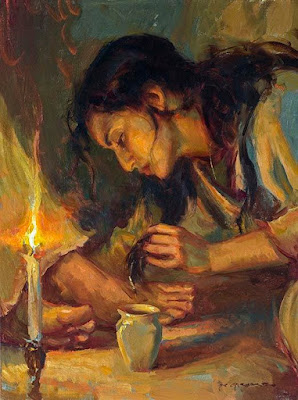On 14 April 1990, I was baptized, confirmed, and received my first Holy Communion in Saint Catherine of Siena Parish/University of Utah Newman Center. Fittingly, then as now, this parish and student center is run by the Dominicans. This great saint and mystic played a role in my conversion.
As I was free, this afternoon I went to my parish church at 3:00 PM to pray the Chaplet of Divine Mercy- a devotional practice I am trying to rekindle. Because I did not recite Morning Prayer this morning, I also went to pray the Office of Readings for Saint Catherine's Memorial. The first reading for the Office, taken from the Common of Virgins, was from the seventh chapter of Saint Paul's First Letter to the Corinthians. In this passage, the apostle wrote: "If you marry, however, you do not sin, nor does an unmarried woman sin if she marries; but such people will experience affliction in their earthly life, and I would like to spare you that."
On one level this is kind of funny, cohering as it does with the cultural way we joke about being married. This way of joking is surely rooted in the lived reality of most married people. On the other hand, if you think about marriage from a Catholic perspective, that is, as a sacrament, it makes sense that you experience affliction in and through being married. Keep in mind that at the beginning of the passage under consideration, Paul admits that what he is about to write about marriage is "no commandment from the Lord." Rather, he gives his opinion.
In my personal pastoral view, when lived properly, the afflictions of marriage help me overcome myself, my inherent selfishness. The afflictions of marriage help relieve me of my desire to always get my own way, my tendency to pursue my own interests and pleasures without regard for others. I am not sure why the apostles wants to spare Christians the afflictions of marriage.
The second reading for today's Memorial is taken from Saint Catherine's Dialogues, particularly her dialogue on Divine Providence. This dialogue points to the same reality towards which Christian marriage points: divine love. There is no earthly relationship, including marriage, that will fulfill your deepest desire. While there may be sublime moments here and there, it is placing way too much of a burden on any person, including your spouse, to expect her/him to fulfill you in the way you truly long to be fulfilled. At root, this is often a source of discontent and perhaps even conflict in a marriage, maybe a launching pad to serial monogamy.
"You are a mystery as deep as the sea," Saint Catherine says to God in this dialogue. "The more I search," she continues, "the more I find, and the more I find the more I search for you." She concludes this thought by admitting "But I can never be satisfied; what I receive will ever leave me desiring more."
Because God is love, love is infinite. Hence, you can never reach the end of love. This brings me back to that phrase that has resonated with me since last Saturday when I encountered it in the ninth day of the Novena- Divine Mercy is an "abyss." What is mercy but love in action? Infinity, with its negative prefix in, means unbounded. Love is an abyss, a fathomless depth.
The first stanza of the Responsory to this reading provided in the Office is:
My sister and my beloved, open yourself to me, you are a co-heir of my kingdom, and you have understood the hidden mysteries of my truthWhat is love if not an opening to another? What is a wound if not an opening? This is indicated by the repeated verse of the Responsory:
You are enriched with the gift of my Spirit, cleansed of all sin by the shedding of my bloodIf love, then, is opening yourself to another, and that opening is a wound, then how can married love not entail affliction. The affliction, it seems, is necessary for everyone.
For our traditio today, I am turning again to Colin Hay. This is a cover from his album of covers: "Ooh Lal La," by Ronnie Lane. First recorded on the eponymous 1973 album by Faces, a band whose members were Ian McLagan, Ronnie Lane, Kenney Jones, Ronnie Wood, and Rod Stewart.















